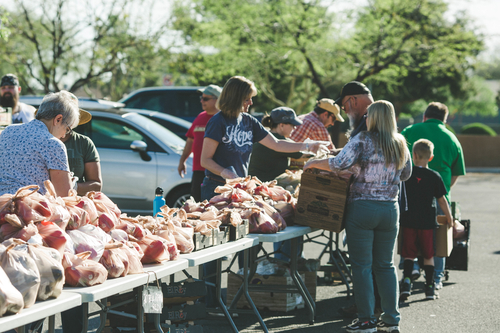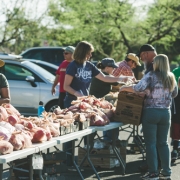A Giving Church
Nor was there anyone among them who lacked; for all who were possessors of lands or houses sold them, and brought the proceeds of the things that were sold, and laid them at the apostles’ feet; and they distributed to each as anyone had need. (Acts 4:34-35)
Going through the early chapters of Acts, we are impressed by the many descriptions of the generosity and sharing of the first Christians. We read of the Christian community in Jerusalem that there was not anyone among them who lacked. No one starved or had no place to live, because the Christians took care of each other.

That took some radical generosity: all who were possessors of lands or houses sold them. Among the 5,000 or so Christians in Jerusalem at that point, some were wealthy. These wealthy believers weren’t taxed into a program of income redistribution. Everyone gave generously and God provided. Remember that the Jerusalem Christians were largely made up of visitors who came as visitors on Pentecost – they were refugees from abroad and had special needs.
I keep noting that they did this among the community of Christians. We don’t read that they did it for everyone who lived in Jerusalem. Christians have a responsibility to take care of those who are fellow believers. We have the opportunity to help those outside the church, but I don’t think we have the responsibility. I just don’t see in the Scriptures where Christians are responsible to feed, clothe, and shelter everyone on earth. But we are called to take care of our own.
Among the believers, they distributed to each as anyone had need. Unfortunately, this generosity was soon abused. Later Paul taught regarding who should be helped and how they should be helped. Paul’s directions include:
– The church must discern who the truly needy are (1 Timothy 5:3).
– If one can work to support himself, he is not truly needy and must provide for his own needs (2 Thessalonians 3:10-12, 1 Timothy 5:8, 1 Thessalonians 4:11).
– If family can support a needy person, the church should not (1 Timothy 5:3-4).
– Those whom the church supports must make some return to the church (1 Timothy 5:5, 10).
– It is right for the church to examine moral conduct before supporting (1 Timothy 5:9-13).
– The support of the church should be for the most basic necessities of living (1 Timothy 6:8).
I think that today the church does a better job with this than most people give credit for. Of course, Christians can and should always do better and do more. But I can’t think of a single voluntary organization that does more to feed, clothe, and shelter their own and the poor of the world than the church.
Today, ask God if there is a believer in need that He wants you to help – and trust that if there is, the Holy Spirit will show you and guide you. Do it with the Biblical wisdom given by Paul and others – but do it!




